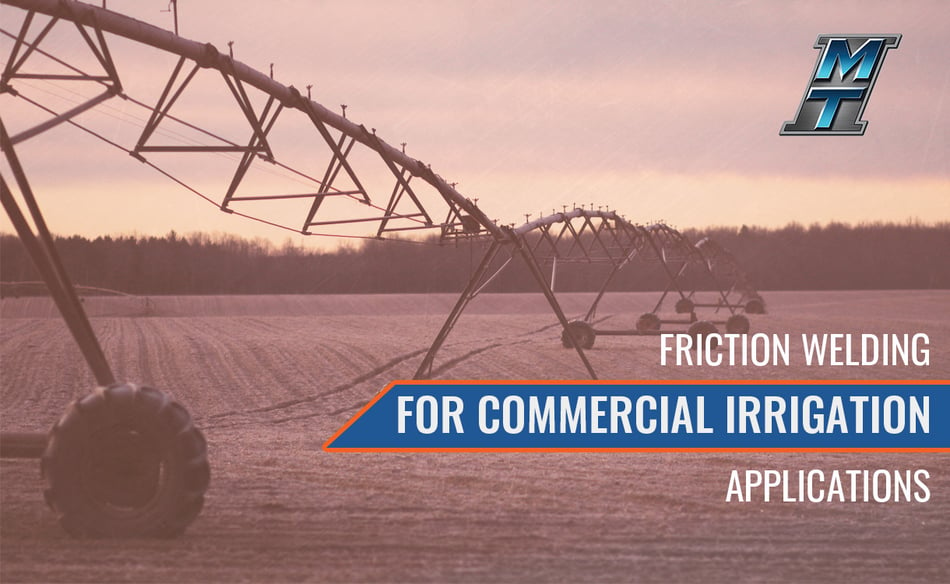
Friction welding has been used for decades to join parts for aerospace, automotive and many other industries. And now, MTI is breaking barriers to join parts for commercial irrigation applications!
What is Friction Welding?
Friction welding is a solid-state welding process that generates heat through mechanical friction between joining parts in relative motion to one another. Because no melting occurs, friction welding produces a stronger weld compared to that of a fusion process. And getting started is easy - MTI offers contract welding services for all of our technologies including Low Force, Rotary, Linear, and Friction Stir Welding.
The Current Problem
Historically, irrigation parts such as pipes, mainlines, and sprinkler systems have commonly been joined by arc and MIG or TIG welding. The problem? Unlike friction welding, arc, MIG, and TIG welding are fusion processes that actually melt the metal being joined together which can weaken the parent properties of the materials and result in a weaker weld joint. Fusion processes are also human-controlled which results in more error and part variability. Currently, irrigation companies are struggling with fusion welding processes due to quality and part repeatability issues.
So, how can friction welding solve the current issue?
Friction welding offers several advantages over fusion processes including:
- Machine-controlled process: Friction welding uses pre-determined parameters which removes human error from the process, making each part consistent with the last.
- Solid-state process: Friction welding creates a 100% forged quality joint.
- Bimetallic joining: Friction welding has the broadest capabilities of any welding method for joining dissimilar materials with the same forged-quality strength.
- Eco-friendly: Friction welding never uses filler material, doesn't emit gas, and cuts down on the material and energy needed, making it more cost efficient as well.
Let's take a look at one company that came to MTI regarding a bimetallic hot rolled mild steel to carbon steel bar-to-plate application used in a commercial irrigation system.
Yielding Success with Friction: A Case Study
Previously, this commercial irrigation company was utilizing fusion welding processes and encountering quality issues and repeated part failures at the weld joint which ultimately led to extended downtime for their customers and increased maintenance costs. They needed a process that would produce a stronger and more sustainable bond. So, they turned to friction welding for a possible solution, and our team got started on a weld development program.

Rendering of a Rotary friction weld for bar-to-plate application.
Now, we know that friction welding creates a solid-state and high-strength bond, but as part of Phase 1 for our weld development, we had to make sure that our customer's part size and materials would be compatible with friction welding. As a bar-to-plate application, we knew our customer needed Rotary friction welding to join the geometry. We selected our tri-mode Rotary friction welder at our Manufacturing Services location which provides the best of both Direct Drive and Inertia friction welding. And using our tri-mode friction welder, we found success with our customer's part size and materials.
When Phase 2 of the weld development was completed, it was time for testing inside MTI's metallurgical lab. Most notably, friction welding performed above expectations on our bend test, creating a much stronger weld than our customer had previously been accustomed to. After successful testing inside the lab, our customer was ready to test the friction welded parts in the field. For this particular application, friction welding was able to extend the useful life of the irrigation component by over 700 hours! That's an extra month of service for their irrigation system, contributing to a decrease in overall maintenance costs!
Friction welding proved to be a superior joining process for our customer, exceeding performance expectations from the lab to the field.
Getting Started
Getting started is easy, just contact one of our sales engineers to get started on a weld development! MTI's comprehensive weld development process is designed to evaluate new or unique applications, so let the experts take it from here.
Website: https://www.mtiwelding.com/
LinkedIn: https://www.linkedin.com/company/manufacturing-technology-inc
YouTube: https://www.youtube.com/c/ManufacturingTechnologyIncMTIJoiningSolutions/videos
 MTI UK
MTI UK  FWT
FWT